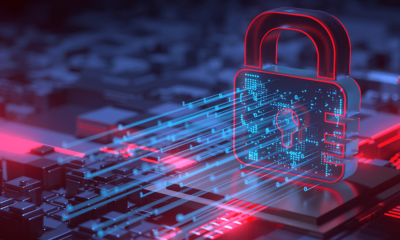News
Understanding the Role of Psychological Warfare in Cybersecurity: Protecting Against Ransomware Attacks

By Abuh Ibrahim Sani
Amidst the technological age teeming with chatter about system loopholes and digital breaches, psychological warfare is rearing its head as a potent arsenal. Cybercriminals, especially those orchestrating ransomware offensives, deftly wield tactics to rattle electronic frameworks and manipulate the human mind. This piece delves into the dynamics of psychological warfare in the digital security realm, spotlighting ransomware onslaughts, while also offering strategies to counteract these maneuvers.
The Emergence of Ransomware
Ransomware, a form of malevolent software, seizes files or paralyzes a computer until a payment is rendered. It has evolved from mere blackmail into a complex criminal network. The emergence of “Ransomware-as-a-service (RaaS)” has lowered the entry bar, allowing even tech novices to initiate assaults, while cryptocurrencies provide a veil for untraceable payments. Yet, as these schemes grow technically intricate, they increasingly employ psychological manipulation to intimidate victims into handing over ransoms.
Psychological Manipulation in Ransomware Attacks
Hackers who take advantage of mental deficiencies sometimes aim to instil panic, bewilderment, hurry, and even guilt in their victims to force them to pay a ransom. Some of the main strategies used in psychology:
- Fear and Intimidation
Attackers use the victim’s fear of losing crucial data or damaging their reputation. After encrypting the files, they frequently display intimidating messages emphasizing the serious consequences of noncompliance, such as permanent data loss or the public disclosure of sensitive information. The countdown timers associated with ransom demands amplify this fear by instilling a sense of approaching doom.
- Urgency and Timer Pressure
Ransomware attackers often use a ticking clock to drive victims to make fast decisions. Setting a short payment deadline creates a sense of urgency that outweighs sound thinking. Victims are presented in uncomfortable situations in which they must decide whether to pay or risk losing their data permanently. The limited decision window is intended to prevent the victim from looking.
- Exploitation of Responsibility and Guilt
Cybercriminals may tailor their communication to capitalize on emotions associated with individual accountability, especially in commercial settings. They may signal that failing to respond quickly would cause harm to the firm, financial injury, or consumer damage, making the individual feel responsible for any negative outcomes.
- Disruption and Chaos
The initial impact of a ransomware assault is often meant to be confusing. Systems fail, files become inaccessible, and routine business operations cease. The abrupt disruption of normal activities produces confusion and alarm, allowing attackers to manipulate emotions and incentivize collaboration through ransom demands.
- The promise of restoration
Reverting to a state of normalcy holds a vast allure for the psyche. Assailants assume the guise of saviours, claiming exclusive prowess to revert the afflicted device to its unbreached condition. They hijack the victim’s data, pledging its liberation post-payment. The urge for straightforward fixes can prompt individuals to consent blindly, oblivious to the broader perils.
Defend Against Ransomware’s Psychological Attacks
Safeguarding against ransomware demands more than firewalls, antivirus programs, and data encryption. It’s imperative to grasp the mental strategies employed and emphasize fortifying your resilience against them. Here are key methods to thwart ransomware assaults that exploit psychological manipulation:
- Preparedness and Incident Response Plans
Reducing the psychological effects of ransomware requires the development and execution of an extensive incident response strategy. Establishing clear protocols for handling cyberattacks aids in reducing disarray and anxiety among affected parties. In a crisis, having a well-organized strategy in place can assist decision-makers and staff to remain composed and make better choices.
- Deliberate Communication
Coordinated, calm, and transparent internal and external communication is crucial during a ransomware attack. Establishing crisis communication procedures in advance will help stakeholders, employees, and clients stay informed and calm. Open and prompt communication counteracts the attackers’ use of haste and terror.
Establishing Time Delays and Decision Protocols
Organizations might impose rules mandating multiple levels of scrutiny before deciding whether to approve a payment to thwart the “urgency” tactic. Companies should refrain from acting out of fear by imposing time delays or requiring legal, financial, and security expert consultation. This acts as a significant deterrent to the psychological pressure that aggressors generate.
- Cybersecurity and Law Enforcement Professionals
This is usually because ransomware perpetrators manipulate their victims’ minds into thinking they can handle the problem on their own. Nonetheless, it might be quite advantageous to involve cybersecurity experts and law enforcement. In addition to limiting the damage, experts can help restore affected equipment and offer alternatives to paying the ransom.
- Backup and Recovery Systems
Removing the ransomware perpetrators’ power over victims is one of the best methods to undermine their psychological strategies. The dread of permanent data disappearance can be significantly diminished by consistently creating backups of crucial information and keeping them in a secure, offline spot. The mental edge possessed by cyber intruders vanishes when ransomware strikes, as those affected can revive their systems from these backups, sidestepping any ransom payments.
- Training and Awareness
Employees receiving frequent cybersecurity education are less prone to fall for mind games. Staff should be instructed on both ransomware threats and the emotional tactics used by cyber villains. Those who grasp the psychological facets of an assault will keep calm and avoid hasty choices when pressured.
Developing Mental Hardiness
In the fight against ransomware, psychological toughness is equally as important as technical resistance. companies must establish a resilient culture by prioritizing preparedness, clarity of thought, and teamwork. Businesses that prioritize mental toughness and organized emergency response strategies are better equipped to thwart ransomware attackers’ emotional manipulation.
Conclusion
The arena of cybersecurity is not solely anchored in tech wizardry; it’s a realm where psychology plays a pivotal role. Those wielding ransomware have honed their craft, preying on human anxieties, urgency, and bewilderment to coerce compliance. To outsmart these threats, one requires a mix of tech acumen and psychological resilience. Establishing incident response strategies, ongoing education, and robust backup protocols empowers organizations to counteract the mental ploys of hackers and shield their precious data. Cybersecurity extends beyond tech defense; it’s about safeguarding individuals against cunning manipulation.
Headlines
Noble Ladies Champion Women’s Financial Independence at Grand Inauguration in Abuja

Women from diverse backgrounds across Nigeria and beyond gathered at the Art and Culture Auditorium, Abuja, for the inauguration and convention of the Noble Ladies Association. The event, led by the association’s Founder and “visionary and polished Queen Mother,” Mrs. Margaret Chigozie Mkpuma, was a colourful display of feminine elegance, empowerment, and ambition.
The highly anticipated gathering, attended by over 700 members and counting, reflected the association’s mission to help women realise their potential while shifting mindsets away from dependency and over-glamorization of the ‘white collar job.’ According to the group, progress can be better achieved through innovation and creativity. “When a woman is able to earn and blossom on her own she has no reason to look at herself as a second fiddle,” the association stated.
One of the association’s standout initiatives is its women-only investment platform, which currently offers a minimum entry of ₦100,000 with a return of ₦130,000 over 30 days—an interest rate of 30 percent. Some members invest as much as ₦1 million, enjoying the same return rate. Mrs. Mkpuma explained that the scheme focuses on women because “women bear the greater brunt of poverty” and the platform seeks “to offer equity in the absence of economic equality.”
Education is also central to the Noble Ladies’ mission, regardless of age. Their mantra, “start again from where you stopped,” encourages women to return to school or upgrade their skills at any stage in life. The association believes that financial stability is vital in protecting women from cultural practices that dispossess widows of their late husbands’ assets, while also enabling them to raise morally and socially grounded families.
Founded on the vision of enhancing women’s skills and achieving financial stability, the association rests on a value system that discourages pity and promotes purpose. “You have a purpose and you build on that purpose to achieve great potentials and emancipation,” Mrs. Mkpuma said.
A criminologist by training and entrepreneur by practice, she cautions against idleness while waiting for formal employment. “There are billions in the informal and non-formal sectors waiting to be made,” she said, rejecting the “new normal of begging” and urging people to “be more introspective to find their purpose in life and hold on to it.”
Mrs. Mkpuma’s management style keeps members actively engaged, focusing on vocational skills and training to prepare them for competitive markets. She is exploring “innovative integration of uncommon technologies” and is already in talks with international franchises to invest in Nigeria, with Noble Ladies as first beneficiaries.
The association’s core values include mutual respect, innovation, forward-thinking, equal opportunity, and financial emancipation. With plans underway to establish a secretariat in the heart of Abuja, the group aims to expand its impact.
The event drew high-profile guests, including former Inspector General of Police, Mike Okiro, and a host of VIPs, marking a significant milestone in the association’s drive for women’s empowerment.
Headlines
NEPZA, FCT agree to create world-class FTZ environment

The Nigeria Export Processing Zones Authority (NEPZA) has stepped in to resolve the dispute between the Federal Capital Territory Administration and the Abuja Technology Village (ATV), a licensed Free Trade Zone, over the potential revocation of the zone’s land title.
Dr. Olufemi Ogunyemi, the Managing Director of NEPZA, urged ATV operators and investors to withdraw the lawsuit filed against the FCT administration immediately to facilitate a roundtable negotiation.
Dr. Ogunyemi delivered the charge during a courtesy visit to the Minister of the Federal Capital Territory, Barrister Nyesom Wike, on Thursday in Abuja.
You will recall that the ATV operators responded to the revocation notice issued by the FCT administration with a lawsuit.
Dr. Ogunyemi stated that the continued support for the growth of the Free Trade Zones Scheme would benefit the nation’s economy and the FCT’s development, emphasizing that the FCT administration recognized the scheme’s potential to accelerate industrialisation.
Dr. Ogunyemi, also the Chief Executive Officer of NEPZA, expressed his delight at the steps taken by the FCT minister to expand the economic frontier of the FCT through the proposed Abuja City Walk (ACW) project.
Dr. Ogunyemi further explained that the Authority was preparing to assess all the 63 licensed Free Trade Zones across the country with the view to vetting their functionality and contributions to the nation’s Foreign Direct Investment and export drives.
“I have come to discuss with His Excellency, the Minister of the Federal Capital Territory on the importance of supporting the ATV to succeed while also promoting the development of the Abuja City Walk project. We must work together to achieve this for the good of our nation,” he said.
On his part, the FCT Minister reiterated his unflinching determination to work towards President Bola Ahmed Tinubu’s Renewed Hope Agenda by bringing FDI to the FCT.
“We must fulfil Mr. President’s promises regarding industrialization, trade, and investment. In this context, the FCT will collaborate with NEPZA to review the future of ATV, a zone that was sponsored and supported by the FCT administration,” Wike said.
Barrister Wike also said that efforts were underway to fast-track the industrialisation process of the territory with the construction of the Abuja City Walk.
The minister further said the Abuja City Walk project was planned to cover over 200 hectares in the Abuja Technology Village corridor along Airport Road.
According to him, the business ecosystem aimed to create a lively, mixed-use urban center with residential, commercial, retail, hospitality, medical, and institutional facilities.
He added that the ACW would turn out to be a high-definition and world-class project that would give this administration’s Renewed Hope Agenda true meaning in the North-Central Region of the country.
Barrister Wike also indicated his continued pursuit of land and property owners who failed to fulfil their obligations to the FCT in his determination to develop the territory.
Headlines
Benue IDPs block highway, demand return to ancestral homes

Vehicular movement along the Yelwata axis of the Benue–Nasarawa highway was brought to a standstill on Wednesday as Internally Displaced Persons, IDPs, staged a protest, demanding immediate return to their ancestral homes.
The protesters, believed to be victims of persistent attacks by suspected herdsmen, blocked both lanes of the busy highway for several hours, chanting “We want to go back home”.
The protest caused disruption, leaving hundreds of motorists and passengers stranded.
Eyewitnesses said the displaced persons, many of whom have spent years in overcrowded IDP camps, are expressing deep frustration over the government’s delay in restoring security to their communities.
“We have suffered enough. We want to return to our homes and farms,” one of the protesters told reporters at the scene.
Security personnel were reportedly deployed to monitor the situation and prevent any escalation, though tensions remained high as of press time.
Efforts to reach the Benue State Emergency Management Agency, SEMA, and other relevant authorities for comment were unsuccessful.
-

 Headlines4 years ago
Headlines4 years agoFacebook, Instagram Temporarily Allow Posts on Ukraine War Calling for Violence Against Invading Russians or Putin’s Death
-

 Headlines4 years ago
Headlines4 years agoNigeria, Other West African Countries Facing Worst Food Crisis in 10 Years, Aid Groups Say
-

 Foreign3 years ago
Foreign3 years agoNew York Consulate installs machines for 10-year passport
-

 News1 year ago
News1 year agoZero Trust Architecture in a Remote World: Securing the New Normal
-

 Entertainment3 years ago
Entertainment3 years agoPhyna emerges winner of Big Brother Naija Season 7
-

 Headlines1 year ago
Headlines1 year agoNigeria Customs modernisation project to check extortion of traders
-

 Economy2 years ago
Economy2 years agoWe generated N30.2 bn revenue in three months – Kano NCS Comptroller
-

 Entertainment2 years ago
Entertainment2 years agoMovie download platform, Netnaija, announces closure















